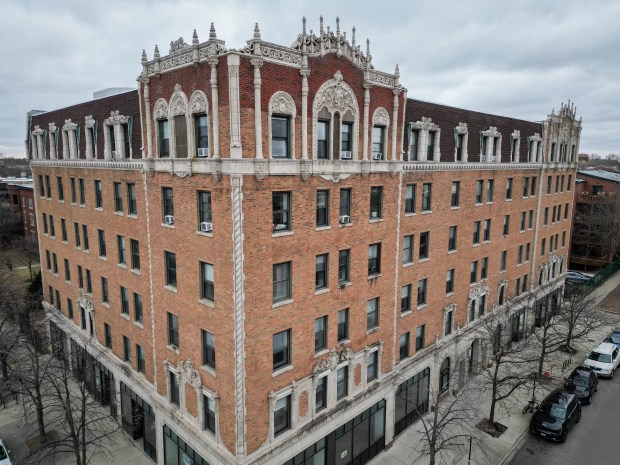The residents of an Uptown apartment building, including many with disabilities, got a reprieve last week when a Cook County judge put off the possible auction and sale of their affordable building until at least the summer. The Leland Apartments was part of Heartland Housing, a nonprofit developer that collapsed in 2023, placing the building under the threat of foreclosure.
City and state officials, working with the mortgage holder, hammered out a plan for Mercy Housing, an affordable housing nonprofit that owns and operates dozens of Chicagoland properties, to take over the 1920s-era Leland, reinvest in the building, enhance resident services and preserve its affordability.
“While the deal is not yet final and is pending required review and approvals, we remain optimistic about achieving this outcome,” said Mercy Housing spokesperson Kate Peterson.
Residents and community advocates, who for the past year pressed officials to keep the 137-unit building off the auction block, praised the new plan, saying it will avoid the Leland’s possible transformation into luxury housing.
“It means we’re going to be able to stay and not have to worry about housing, which is great,” said Jeff Martin, a 61-year-old who moved into the Leland at 1207 W. Leland Ave. in 2022 after a stroke left him unable to work.
The six-story building was one of more than two dozen Heartland Housing properties that together provide hundreds of affordable units, many sheltering those at greatest risk of homelessness, including seniors, veterans and those with disabilities or mental health issues. The nonprofit struggled to properly staff and maintain the properties after rent collections declined in the pandemic’s wake, and many residents complained about a lack of security, high vacancy rates and deteriorating physical conditions.
The court in 2023 appointed the nonprofit Community Initiatives, which runs the city’s Troubled Buildings Initiative, as receiver to oversee Heartland’s portfolio. Alongside city and state officials, last year it secured new owners willing to keep units affordable for most of Heartland’s portfolio. But finding a group willing to take over the Leland proved tough.
Mercy Community Capital, the nonprofit lending arm of Denver-based Mercy Housing, holds the Leland’s mortgage. The property was losing money and the $2 million mortgage was in default, according to court documents. In October, the nonprofit asked a Cook County judge to allow a foreclosure and auction, telling the court in an affidavit that it reached out to more than 30 potential buyers without success.
“Due to the extreme needs at the property, none of these potential owners have been willing to take over the property,” Vice President Brian Sample stated.
But city and state housing officials then secured an agreement with Mercy to call off the sale. Instead, it will now come up with its own financial plan to assume ownership, launch needed renovations and preserve the Leland’s affordability.
“To date, we’ve completed the transfer or identified a new owner for all but one of the Heartland Housing properties, and they will remain affordable options for residents,” said Chicago Department of Housing spokesperson Michael Cox.
Heartland properties already under new ownership include Hollywood House, a 12-story building for seniors at 5700 N. Sheridan Road in the Edgewater neighborhood, and Town Hall Apartments, a modern, 79-unit affordable building for LGBTQ seniors at 3600 N. Halsted St. in the Lakeview neighborhood, both taken over last year by affordable housing provider Full Circle Communities. The national nonprofit Preservation of Affordable Housing took over several Heartland properties on the West Side, including the 89-unit Harvest Commons at 1519 W. Warren Blvd. in the West Loop.
Mercy Housing and government officials will report progress on their plans for the Leland to Judge William B. Sullivan in a July hearing.
“What we’re appreciative of is that residents have been attending the court hearings since June, and the judge has always been very inclusive, and listened to what they had to say,” said Dordie Hester, a community organizer with the advocacy group ONE Northside.
Martin said it’s vital to preserve affordable housing, especially for the disabled, in Uptown, a gentrifying lakefront neighborhood where developers have created a lot of luxury housing.
“It’s a walkable neighborhood and everything is accessible,” he said.
Hester said the residents and ONE Northside, which advocates for affordable housing, neighborhood safety and clean energy, are breathing a sigh of relief but will continue to monitor how Mercy Housing’s plans take shape.
“No one has made any promises to the residents directly.”




